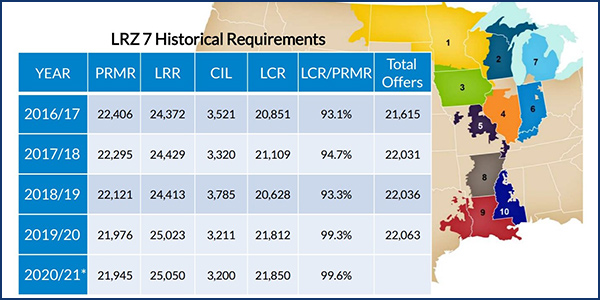By Amanda Durish Cook
MISO will sharpen its focus on the northern portion of its footprint with two supplemental studies to be included in its 2020 Transmission Expansion Plan (MTEP 20) cycle.
The RTO has planned special transmission studies for both Michigan and the Minnesota-Wisconsin border, both of which it discussed at the Planning Advisory Committee’s meeting Wednesday.
MTEP 20 will contain a special study into the increasingly tight capacity import and export limits (CILs/CELs) in lower Michigan’s Zone 7. The study is being performed at the request of the Michigan Public Service Commission and will help the state “better understand the effects” of increasing either the CIL or CEL for Zone 7, according to MISO.
Tony Rowan, MISO senior manager of seasonal and generator deliverability, said decisions to move ahead with any projects to increase Zone 7’s CIL and CEL values would be up to transmission owners and the state, not RTO staff. He said the study “will help Michigan to meet it reliability goals and evaluate the potential costs and benefits of increased CILs and CELs.”
Zone 7 has a preliminary 3,200-MW CIL for the 2020/21 planning year, a five-year low. Last year, the zone had a 1,358-MW CEL, down from 2,578 MW in 2018/19. For the 2020/21 planning year, MISO’s analysis could not identify a CEL, officially listing it as “no limit found.”
As requested by the Michigan PSC, MISO will examine 500-, 1,500- and 3,000-MW incremental increases to the Zone 7 CIL. The RTO expects to have results by November.
PSC Commissioner Dan Scripps said that while the commission only requested MISO investigate lower Michigan, Zone 2 (Wisconsin and the Upper Peninsula) and Mississippi’s Zone 10 also have narrow limits that could be ripe for study.
MISO staff late last year said Zones 2 and 7 are the closest to being unable to meet their local clearing requirements based on results from the RTO’s 2019 resource adequacy survey with the Organization of MISO States (OMS). (See MISO Planning Reserve Margin to Climb in 2020.)
WEC Energy Group’s Chris Plante asked whether the PSC’s study request could strain MISO planners, wondering what would happen if several other stakeholders requested one-off studies.
“At what point does this become a burden on MISO’s resources?” he asked.
“We’ll let you know,” MISO Director of Planning Jeff Webb joked, then adding more seriously that the RTO will monitor its ability to accommodate targeted study requests. He said MISO might one day institute “a global import study of all zones.”
“We have a special place in our hearts for state regulators, and when they ask, we try to do our best to accommodate them,” Webb said.
Indiana Utility Regulatory Commission staffer David Johnston also pointed out that OMS rarely exercises its right to request studies from MISO.
Meanwhile, MISO will hold a special meeting at the end of the month on its special analysis of the Minnesota-Wisconsin export (MWEX) interface limitation.
The MWEX transfer limit is the subject of another special MTEP 20 study, dubbed the North Region Economic Transfer Study. MISO said it’s expecting “bottle necks” especially in its North Region, which already contains high wind penetration. (See MWEX Study Could Elicit New Tx Planning for MISO.)
MISO has scheduled a Feb. 28 workshop for a technical discussion of the study’s assumptions and scope.
“Our focus here is to really study how this constraint limits economic dispatch,” MISO Resource Interconnection Planning Manager Neil Shah said.
MTEP 20 Schedule Change
The approval of MTEP 20 will also be held to a different timeline than in previous years.
MISO Project Manager Sandy Boegeman said the RTO will this year revise the schedule to allow the Board of Directors’ System Planning Committee more time to review the MTEP package prior to the full board vote in early December.
That means the PAC will also review, then vote on, whether to recommend the draft MTEP 20 report about a month earlier than usual. MISO plans to post the report on Aug. 19 instead of the usual mid-September. The PAC vote will move up to the committee’s Sept. 23 meeting instead of mid- to late-October.
Finally, the System Planning Committee will decide whether to advance the MTEP 20 report to the full board on Oct. 26 instead of late November.





